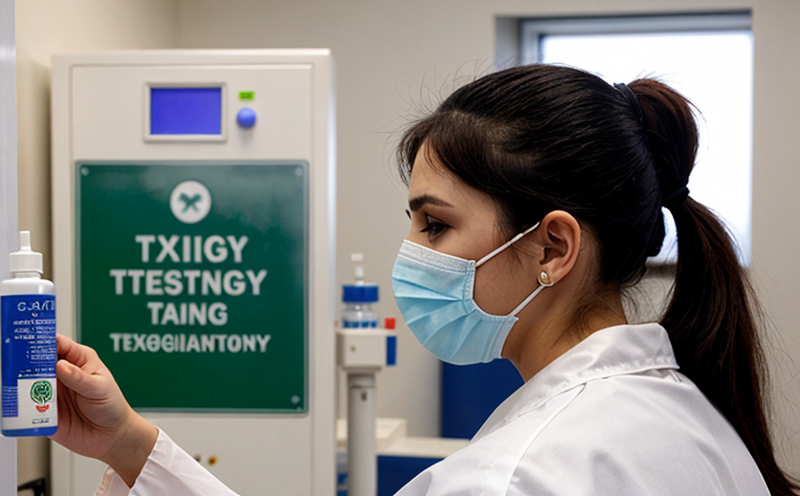Safety Pharmacology Exploratory Respiratory Testing
In the realm of pharmaceutical testing, safety pharmacology exploratory respiratory testing is a critical aspect aimed at evaluating potential adverse effects on the respiratory system. This service focuses on identifying any toxicological or safety issues that may arise during drug development and manufacturing processes. The primary goal is to ensure that new compounds are safe for human use by assessing their impact on various physiological parameters of the respiratory tract.
The testing encompasses a wide range of endpoints, including airway resistance, lung mechanics, bronchoconstriction, and more. These assessments are conducted using specialized equipment designed to simulate real-world conditions under which the drug may be administered or inhaled. The tests help determine whether there is any significant irritation, inflammation, or other harmful effects that could compromise patient safety.
Our state-of-the-art laboratory employs advanced technologies such as plethysmography chambers and spirometry systems to conduct these evaluations accurately and efficiently. Additionally, we utilize cutting-edge analytical methods like mass spectrometry and high-performance liquid chromatography (HPLC) for precise quantification of drug concentrations in biological samples.
Testing protocols follow internationally recognized guidelines provided by organizations such as the International Conference on Harmonisation (ICH), which ensures consistency across different regulatory jurisdictions worldwide. Compliance with these standards is crucial for ensuring that our results are accepted by various health authorities including those in Europe, America, and Asia.
The process begins with thorough preparation of the test samples according to predefined criteria set forth by industry best practices. Specimens undergo rigorous quality control checks before being analyzed using sophisticated analytical tools capable of detecting even trace amounts of active ingredients or metabolites.
Once testing is complete, comprehensive reports are generated detailing all findings along with recommendations for further investigation if necessary. Our team of experienced scientists provides expert interpretation of the data collected during each phase of the evaluation process, ensuring that every aspect of respiratory safety is thoroughly examined.
In summary, our safety pharmacology exploratory respiratory testing service offers a robust framework for assessing potential risks associated with new pharmaceutical products. By adhering strictly to established protocols and leveraging leading-edge technology, we provide clients with reliable information necessary for making informed decisions throughout the drug development lifecycle.
This approach not only enhances product quality but also contributes significantly towards protecting public health by minimizing unnecessary exposure to potentially harmful substances.
Applied Standards
The testing of pharmaceuticals involves adherence to numerous international standards and guidelines aimed at ensuring safety, efficacy, and reliability. For exploratory respiratory tests specifically, several key documents guide our methodology:
- ICH S7A - Safety Pharmacology Studies for Human Use Drugs: This guideline outlines the principles and requirements for conducting preclinical safety pharmacology studies including those focused on respiratory effects.
- ASTM E2583 - Standard Practice for Conducting Respiratory Toxicity Studies in Rodents Using Whole-Body Plethysmography: This document provides detailed procedures for performing whole-body plethysmography tests, which are essential for assessing airway responsiveness and lung mechanics.
- EN 14560 - Inhalation Toxicology Testing of Medicinal Products: European standard specifying conditions under which inhalation toxicity testing should be performed using various animal models.
- IEC TR 62789 - Safety of Medical Electrical Equipment Particular Requirements for Respiratory Systems: Although primarily focused on medical devices, this technical report offers valuable insights into ensuring safe operation of respiratory support systems used during testing.
By incorporating these standards into our protocols, we ensure that all aspects of the testing process meet regulatory expectations while maintaining scientific rigor and reproducibility.
Industry Applications
Exploratory respiratory testing plays a pivotal role in several industries where respiratory health is paramount. Pharmaceutical companies rely heavily on this service to ensure that their products do not pose risks to patients' breathing capabilities. Here are some specific applications:
- New Drug Development: During early stages of clinical trials, it's vital to screen compounds for any adverse reactions involving the respiratory system.
- Formulation Optimization: Adjustments in formulation can have significant impacts on how a drug behaves when inhaled or aerosolized. Testing helps identify optimal conditions that minimize side effects while maximizing therapeutic benefits.
- Regulatory Compliance: Meeting stringent regulatory requirements is crucial for gaining approval to market new drugs successfully.
- R&D Innovation: Continuous innovation requires constant evaluation of emerging technologies and materials to understand their potential impacts on human health.
- Patient Safety Monitoring: Once marketed, ongoing monitoring ensures that no unforeseen issues arise over time as patients use the product long-term.
Our expertise in this area allows us to support clients across multiple sectors, from biotechnology startups to large multinational corporations. Whether you're just beginning your R&D journey or already established within the industry, our services can help enhance your product offerings and meet regulatory demands effectively.
Environmental and Sustainability Contributions
Beyond direct healthcare benefits, our safety pharmacology exploratory respiratory testing also contributes positively to environmental sustainability efforts. By identifying early signs of toxicity or adverse effects, we enable the development of safer products that have reduced ecological footprints.
For instance, by minimizing the need for extensive clinical trials later in the product lifecycle due to earlier detection of potential issues, our services can help reduce overall resource consumption associated with pharmaceutical production. Furthermore, through rigorous testing and quality assurance measures, we contribute to reducing waste generation within manufacturing processes.
Our commitment to sustainability extends beyond just internal operations; it also involves educating stakeholders about best practices in respiratory toxicology and safety pharmacology. This knowledge sharing fosters a culture of responsible innovation among partners and collaborators, promoting long-term environmental stewardship across the entire value chain.





